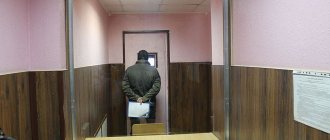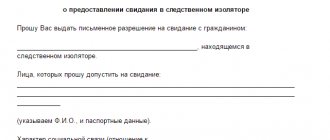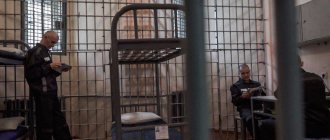A person in a pre-trial detention center has the right to meetings with a lawyer (without restrictions in number) and meetings with loved ones (twice a month). But an important condition is that before the meeting you must submit a request and obtain permission from the judge, investigator or head of the detention center.
The peculiarity of visits in a pre-trial detention center is that they can only be short-term, no more than 3 hours. This is regulated by Federal Law No. 103-FZ “On the detention of suspects and accused of committing crimes.” Are long-term ones allowed? Long meetings are permitted only after the verdict has been announced and the defendant has been transferred to a correctional colony.
Who are they allowed in?
Visits can be held from the first day of actual detention. Who is entitled to meetings according to the law? The following may come to the pre-trial detention center:
- lawyers handling the defendant's case;
- notaries to prepare documents necessary in court;
- family members of the prisoner and people who are not related to him by blood.
Attention . Unfortunately, there are common cases when people who are not relatives of the person being held in the pre-trial detention center (for example, colleagues or cohabitants who are not officially married) are not allowed to attend meetings. Please be aware that this is a direct violation of rights.
So how can you get to a meeting in a pre-trial detention center if you are not a relative? Article 18 of Federal Law No. 103-FZ “On the detention of suspects and accused of committing crimes” clearly states: “Suspects and accused, on the basis of the written permission of the person or body in charge of the criminal case, may be granted no more than two visits per month with relatives and other persons.”
Consequently, any refusal based only on the lack of confirmation of kinship can be appealed to a higher authority (through the Prosecutor General's Office, the Federal Penitentiary Service, etc.).
There is no law prohibiting meetings with minors . For example, a wife can take her young child on a visit with her detained husband (the situation is complicated only by the fact that for each visitor, including small ones, a request must be submitted separately).
Children and adolescents under 18 years of age are prohibited from visiting a pre-trial detention center alone; the presence of an accompanying adult is mandatory.
How many meetings are there and what is their duration?
A lawyer can hold conversations with his client at least every day - there are no restrictions on the number of meetings, meetings are limited only by duration (up to 3 hours).
As for visits to the pre-trial detention center by close people (relatives and friends), there is a strict limitation of up to 2 times a month (clause 139 of the Internal Regulations of the pre-trial detention center, order of the Ministry of Justice No. 189 of October 14, 2005). The maximum duration of one date is 3 hours .
As we already wrote at the very beginning, in the introduction, there are no long visits in a pre-trial detention center!
Who is allowed to see the convicted person?
While in prison, a criminal can see a limited number of people. In most cases, family members and close relatives come for visits.
The list of citizens who are allowed to see a prisoner is specified in Article 89 of the Penal Code of the Russian Federation. We are talking about the following persons:
- parents;
- siblings;
- adopted;
- adoptive parents;
- children;
- grandchildren;
- spouse;
- grandparents.
Common-law wives/husbands of convicted persons may also have the opportunity to have a long meeting with the prisoner. To do this, you must obtain permission from the head of the correctional colony. Other persons are allowed only short-term visits.
The defense attorney can communicate with his client without any restrictions. The law does not establish a maximum number of such meetings. The lawyer meets with the convicted person alone, in a room where there are no wiretapping devices.
Certain restrictions on negotiations with a lawyer existed until 2006. Thus, the convicted person was allowed to communicate with the defense lawyer in his free time from work. However, this restriction was later found to be unfounded. Therefore, today a convicted person can meet with a defense lawyer at least every day. The maximum duration of a visit is limited to four hours.
Is it possible to transfer something?
During one visit to the pre-trial detention center, you can settle several matters: talk with the prisoner, arrange the transfer and deposit money into the prisoner’s account.
The following are permitted for transfer (the list may be slightly adjusted depending on the procedures in a particular pre-trial detention center):
- toothbrush and toothpaste;
- underpants and socks;
- laundry soap and shampoo;
- cigarettes;
- tea and coffee;
- instant food and canned food (no more than 2 cans);
- salt and sugar;
- sweets without wrappers and cookies (no more than 2 kg);
- fruits and vegetables that can be eaten raw (for example, onions, garlic, tomatoes, cucumbers);
- bakery products;
- juices in transparent packages.
Things and products are not passed from hand to hand during a meeting, but through inspectors who inspect the goods and reject those that seem dubious to them. The prisoner receives the parcel within 1-2 days after the transfer is completed.
According to Article 25 of Federal Law No. 103-FZ “On the detention of suspects and accused of committing crimes,” a pre-trial detention center prisoner can receive parcels with a weight limit of no more than 30 kilograms per month. The parcel is handed over to the suspect or accused no later than one day after their receipt.
For reference : meat products such as boiled sausage, lard, sausages are not on the list of prohibited items, but most often they are not accepted. The reason is safety - pre-trial detention center workers are not responsible for the storage conditions of food (meat can spoil and cause poisoning).
The transfer is strictly prohibited:
- alcohol;
- any type of weapon;
- drugs;
- phones and SIM cards (read more about whether you can use a phone in a pre-trial detention center here);
- materials related to the criminal case;
- pornographic products;
- explosives.
If attempts are detected to smuggle the listed products to prisoners, the visitor to the pre-trial detention center will be held administratively or criminally liable.
From the video below you can learn how to collect a parcel in a pre-trial detention center, what to put in it:
For those who find themselves in a pre-trial detention center for the first time, it is important to know how to behave for the first time and how the time in a pre-trial detention center is counted towards the total term of imprisonment.
How are they going?
For holding meetings, two types of halls are equipped in the pre-trial detention center . The first is for investigative and legal conversations. Their peculiarity is their small size and the ability to ensure the confidentiality of conversations (supervisors can only observe, but not eavesdrop). The conversation takes place directly, without a dividing partition or telephone.
For short-term meetings with relatives and friends, there is a hall with booths fenced off from each other. Communication with prisoners occurs through a partition made of transparent polymer material that is shock-resistant. In some pre-trial detention centers, in addition to a partition between those talking, there are also bars and a corridor about a meter wide, along which the guard moves. The conversation is carried out through a telephone.
Is security watching?
The procedure for the security service during visits is regulated by Chapter 16 of the “Internal Regulations of Pre-trial Detention Facilities of the Penitentiary System” (approved by Order of the Ministry of Justice of the Russian Federation dated October 14, 2005 N 189):
- During meetings with lawyers, the pre-trial detention center officer can see the prisoner and his defense lawyer, but not hear their conversations.
- When meeting with relatives and friends, security has the right to conduct visual surveillance of the arrested person and his guests, as well as listen to the entire conversation.
When monitoring meetings with a lawyer, only a picture from a video camera is used ; security guards have no right to be present in the room. When a prisoner meets with relatives and friends, the guards must be nearby, in the same room.
Sex on a date in prison
It's no secret that long-term dates are created, for the most part, specifically to satisfy sexual needs.
No matter how delicate this topic may be, once on a date, couples forget about any embarrassment or poor conditions and immediately begin to fulfill their marital duty.
The visiting rooms are located in a row in the same hallway, so you can easily hear your neighbors having fun.
The following circumstances often create a problem:
- In some colonies it is forbidden to close the door;
- In many colonies, several visiting rooms share a toilet and shower;
- Colonial officers often monitor the love of convicts in their cells.
Although for those who are very bored, none of the above factors stops them from wanting intimacy.
In what cases can they interrupt?
Remand prison workers have the right to prematurely stop a meeting between a prisoner and his visitors, but there must be compelling reasons for this. According to paragraph 147 of Chapter 16 of the “Internal Regulations of Pre-trial Detention Facilities of the Penitentiary System,” a visit can be interrupted if:
- The prisoner or his visitor shows signs of aggression (screaming, trying to damage the property of the detention center, etc.).
- The fact of illegal transfer of any items or food products to a prisoner was recorded.
- Pressure is exerted on the prisoner or if the prisoner tells his relatives any information related to the criminal case (that’s why all conversations are wiretapped).
- The visitor violates the rules of conduct (for example, tries to smoke in the meeting room or tries to communicate with prisoners from neighboring booths, etc.).
When holding short-term meetings in a pre-trial detention center, it is allowed to speak only Russian . You cannot bring technical communications equipment, computers, photo, audio, or video equipment into the visiting room.
Attention : even if you have a permit document, a person may not be allowed to have a meeting in a pre-trial detention center if he shows up for a meeting drunk, does not provide identification, refuses to be searched, or behaves inappropriately (swearing, getting into an argument or fight with prison staff or other visitors) .
Visits may also be prohibited if a quarantine has been declared in the pre-trial detention center or a regime of special conditions has been introduced.
What can you take with you to a meeting with a prisoner?
There is an approved list of prohibited items for bringing into the territory of correctional institutions. It includes:
- Drugs, alcohol and tobacco.
- Communication equipment and laptops.
- Money and jewelry.
- Weapon.
Everything that is not included in this list can theoretically be taken with you. But in practice, since the guest and the prisoner on a short-term visit should not have physical contact, bringing any things is pointless. They are more likely to alert the guards, who will suspect the visitor’s desire to illegally transfer them to the prisoner. Therefore, it is better to leave personal belongings at the checkpoint against the signature of the colony officer.
It is understandable to want to take printed photographs with you to a meeting. This is not prohibited, but you should first notify the colony officer about their presence and show him these photographs.
How to get permission?
How to get to a meeting in a pre-trial detention center? The first thing to do is fill out and submit permit applications. It can be written by hand or printed on a computer.
The application must be drawn up strictly in the prescribed form , otherwise it will not be accepted as an official document.
Currently the following template is considered valid:
- In the upper right corner, indicate the addressee (in the next paragraph we will tell you to whom exactly you need to send your request) (his position, title, full last name, first and patronymic abbreviated) and the applicant (full full name, residential address, passport series and number).
- By . From a red line across the entire width of the sheet - a request for a meeting with the prisoner, indicating the degree of relationship, his full name (in full) and year of birth.
- At the bottom left is the date, month and year of writing the appeal.
- Below on the right is the applicant’s last name, first name and patronymic and handwritten signature.
A judge, head of a pre-trial detention center or investigator has the right to consider a request for a visit to a pre-trial detention center within two weeks from the date of filing the request.
Submitting it through a lawyer will significantly reduce the time it takes to consider an application (in this case, you can expect to receive permission within a couple of days).
If the application is accepted and the visit is permitted, the applicant is issued a ticket addressed to the head of the pretrial detention center. The right to a one-time visit to a pre-trial detention center extends to two weeks from the date that will be indicated at the bottom of the document. If after 14 days the right to visit is not used, the request will have to be submitted again.
Along with the application and permission, you must go to the pre-trial detention center. Please note that visits are carried out according to a schedule . As a rule, this is Monday, Tuesday, Wednesday, Thursday from 9.00 to 18.00 (applications are accepted only in the first half of the day).
Next, you can watch a video about how to get permission to visit in a pre-trial detention center with a high probability:
Standards depending on the MLS regime and content
The number and duration of long-term visits allowed to convicted prisoners during the year depends on the type of correctional institution and the conditions of the regime for those serving their sentences.
All meetings with loved ones take place on the territory of the correctional institution in specially designated rooms.
The number of long-term visits established by the RF PEC is as follows.
Colony settlement
The number of visits is not limited until the permanent residence of the convicted person with his family (at his expense) is permitted within the colony-settlement or locality where the colony is located. But PS employees are authorized to inspect the residential premises they occupy at any time of the day.
We talk in more detail about what a colony-settlement is in a special article, and read about the regime and conditions of detention in such institutions here.
General regime correctional colony
- For those serving sentences in strict conditions, only 3 long visits per year are allowed.
- Under normal conditions - 4 per year; in addition, for the mother of children under 14 years of age, as well as the father, if due to circumstances he is the only parent of the child, visits with children on weekends and holidays outside the colony may be allowed, but only on the territory of the municipality where the correctional facility is located.
- Under easier conditions – 6 dates per year; and for parents of young children - in unlimited quantities.
You can find more information about the nuances of detention in general regime colonies here.
Strict
- Strict conditions - no more than 2 dates per year are allowed.
- Under normal conditions - 3 per year.
- For the lighter ones – 4 dates.
You can read about how prisoners are kept in high-security prisons here, and in this article we talked about what rules are established for prisoners there.
Special
- Strict conditions - only one date per year.
- Regular – 2 during the year.
- Lightweight – 3 dates.
- A special regime for those sentenced to life imprisonment (Article 127 of the Penal Code of the Russian Federation) - for the first 10 years, such persons serve their sentences under strict conditions and only after their expiration can they be transferred to ordinary conditions (lighter conditions are not allowed).
The number of annual visits for this category of persons is determined by analogy for strict and ordinary conditions - the first ten years, no more than 1 per year, subject to subsequent transfer to the usual regime - 3 visits per year.
You can find out what a special regime colony is and what rules it has for prisoners in our material.
Prisons
- Strict regime - only one date per year.
- For general mode – 2 dates.
Educational institutions for minors
- Strict conditions - 3 long dates per year.
- Regular – 4 during the year.
- Lightweight – also 4 meetings per year, but it is possible to live outside the colony for the period of the meeting.
- Preferential conditions – 6 visits with accommodation outside the walls of the correctional institution.
The convict can count on a first date almost immediately upon his arrival at the correctional institution after his transfer from the quarantine department to the detachment (quarantine is mandatory for all newly admitted to the prison and lasts no more than 15 days). But you will need to write an application in order for the date to be included in the existing schedule and wait for your turn.
Regular meetings with loved ones are scheduled after an equal period, calculated from their permitted number during the year (clause 73 of Order No. 295 of the Ministry of Justice of the Russian Federation).
You can learn more about the features of children's educational colonies for minors in Russia here.
Features during investigations and after sentencing
The rules for visiting a pre-trial detention center are the same for all stages of criminal proceedings . The only difference is in whose name you need to write applications for a date:
- To the investigator before the trial, when the case is in pre-trial proceedings.
- To the judge or chairman after the case has been submitted to the court.
- To the head of the pre-trial detention center, if a sentence has been passed, but the convicted person has not yet been transferred to a penal colony.
Officials do not have the right to prohibit visits required by law only on the basis that an investigation is underway or a sentence has been passed.
Order of appointment
To meet with family or friends, the prisoner must take the following actions:
- Write an application for a short-term visit in advance. Permission for this must be given by the head of the colony.
- If you want to transfer food or things to a prisoner, you should do this before goodbye, especially since in the penal colony there are usually long queues at the parcel delivery points.
- Expect an invitation to a date. The waiting period can reach several hours.
- Go through security check. Usually, before a short-term visit, colony staff probe clothing in search of prohibited items.
- The meeting itself lasts 4 hours in a special room under security supervision.
- Repeated search of the prisoner and visitors after the end of the visit.
The procedure seems simple, but in practice it involves waiting for many hours. The fact is that in most prisons there are very long queues of people wanting to meet their relatives. As a result, an application for a visit may only be approved the next day, which makes it difficult for out-of-town guests to visit the convicted person.
Experienced visitors come to queue a few hours before the IC administration starts work.
In what cases can they be prohibited and what to do if they refuse?
The applicant may be denied a meeting with a person in a pre-trial detention center if the investigator or judge considers such a meeting to interfere with the criminal proceedings. The official must give reasons for his decision, and relatives and friends have the right to challenge the refusal received by filing a complaint with higher authorities. To do this, you need to perform two actions:
- Request from the person who refused the visit a written confirmation of his decision (application for such a document can be made in person or by registered letter).
- Send the confirmation of refusal received to the higher authority along with your statement of request to reconsider this ban. The application can be submitted on behalf of a visitor who has been banned from visiting, or on behalf of the lawyer of a person in a pre-trial detention center.
If the investigator or judge refused to give reasons and issue written confirmation of their refusal, then you must declare a violation of your rights.
To do this, write a complaint, which should contain the following information:
- Information about the applicant (full name, registration address, passport details) and about the person under investigation with whom you need to attend a meeting in the pre-trial detention center (full name, address of the pre-trial detention center).
- Description of gross violations of the persons who should have issued permission for the meeting (indicate the date of filing the application, write your opinion about the groundlessness of the refusal, describe the unlawful actions of officials who impede the meeting).
A complaint can be sent to any of the following authorities:
- Federal Penitentiary Service of Russia for the region where the pre-trial detention center is located.
- Federal Penitentiary Service of the Russian Federation.
- Prosecutor's Office for Supervision of Compliance with Laws.
- Commissioner for Human Rights in the Russian Federation.
- Interstate bodies for the protection of human rights.
- The Constitutional Court of the Russian Federation on checking the constitutionality of the law.
What to do if the investigator does not allow a visit
When rejecting applications, it is necessary to demand that the refusal itself be formalized in writing. Both the relatives themselves and the accused can receive a response document. The same right remains with the lawyer. The head of the pre-trial detention center is contacted along with the document after receiving a response.
Sometimes such measures do not bring the desired results. Then they proceed to contact the prosecutor’s office, or ask for help from representatives of the European Court of Human Rights. Appeals are also considered without fail.
Refusal to visit the accused rarely comes from judges and heads of pre-trial detention centers . An exception is made for situations where pressure on the investigation is clearly revealed. Or in case of serious violations of internal regulations. A cassation appeal is filed if the other party does not agree with the decision, although it was made in court.









